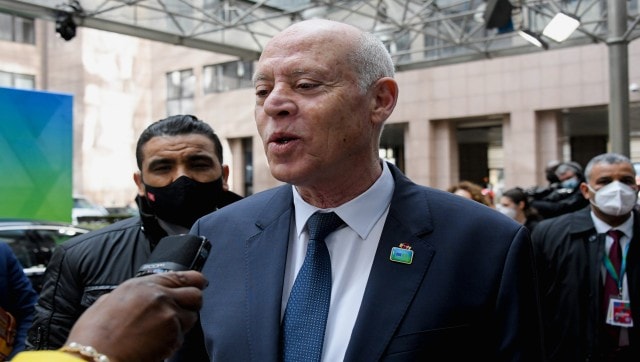

Tunisia’s President Kais Saied speaks to the media as he arrives for the first day of a European Union- African Union summit at the European Council building in Brussels, Belgium. Reuters File
Kais Saied, the president of Tunisia, rejected the financial assistance announced by the European Union in September on Monday, claiming that it is insufficient and violates a three-month-old agreement.
Saied’s action could jeopardize the “strategic partnership” from July, which included efforts to fight people traffickers and tighten borders, and which came at a time when there was a substantial spike in the number of boats leaving North Africa for Europe.
As part of the agreement to combat illegal immigration from Africa to Europe, the European Commission said last month that it will provide Tunisia with help totaling 127 million euros ($133 million).
“Tunisia rejects what the EU announced, not because of the small amount … but because the proposal conflicts with the memorandum of understanding signed in July,” Saied said.
The July deal included a pledge of 1 billion euros in aid to Tunisia to help its battered economy, rescue state finances and deal with the migration crisis.
The smaller amount announced by Europe 10 days ago, however, has frustrated Tunisian authorities struggling to improve public finances and raised fears among credit rating agencies that the government could default on foreign debts in coming months.
The dispute between the two parties has coincided with the arrival of record numbers of migrants from Tunisia and North Africa to Italy’s island of Lampedusa.
Tunisia last week postponed a visit by a delegation from the European Commission to discuss the details of the migration agreement.
Last month it also denied the entry of five members of the European Parliament’s foreign affairs committee for meetings over the political situation in Tunisia, saying it would not allow interference in its affairs.
Some European countries, including Germany, oppose the immigration deal, saying it does not address human rights issues and the political situation after Saied seized power, shut down the Tunisian parliament and began ruling by decree in what the opposition says was a coup.
Published on: October 03, 2023 12:00:10 IST





